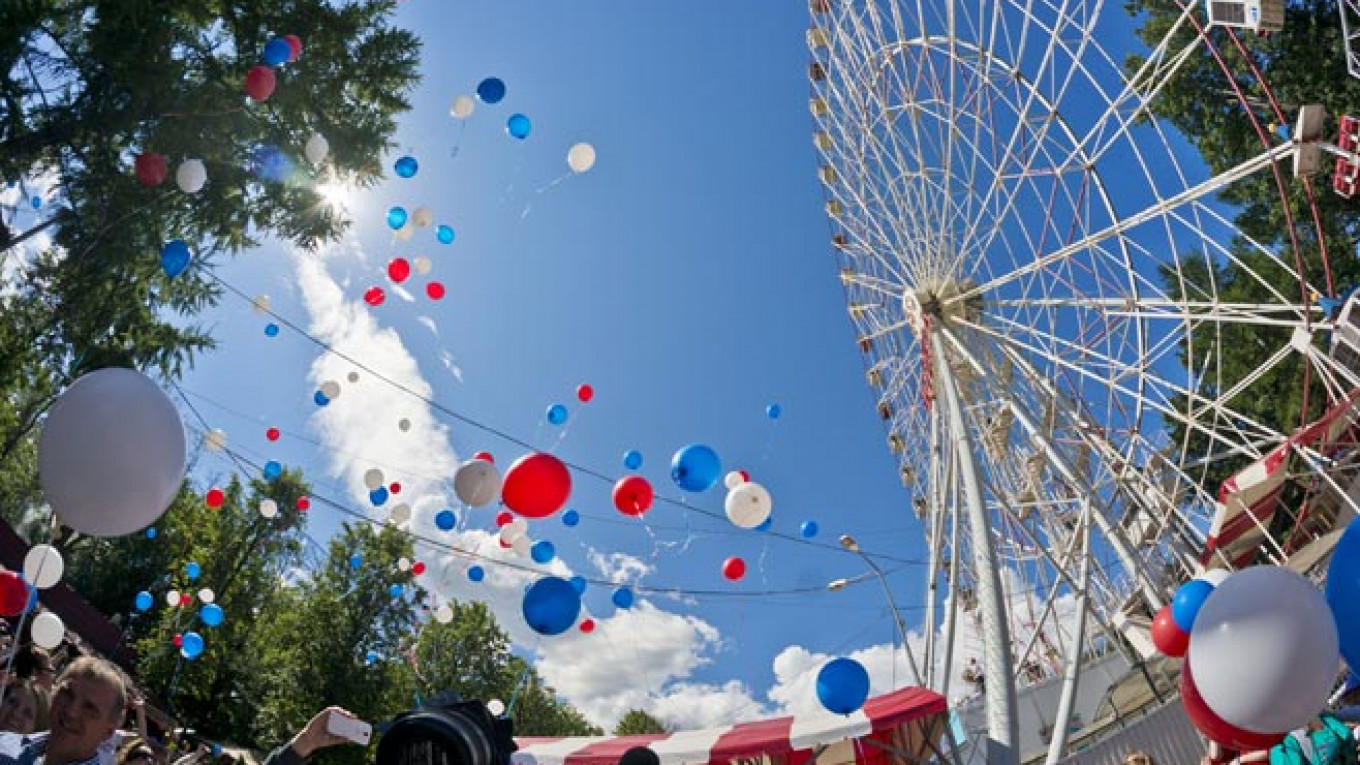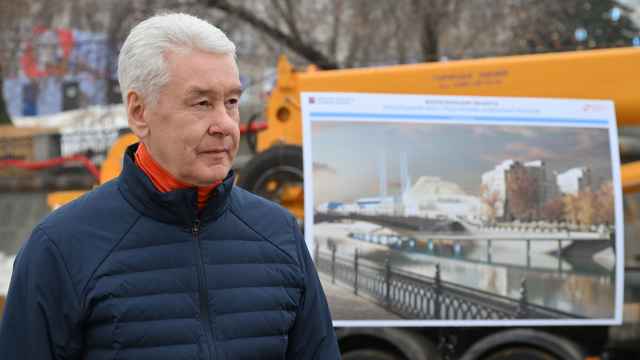"This will be the eighth time we have gone round," said an excited Vadim Korenkov, 25, as he sat, tuba strapped to his body at the top of the towering ferris wheel. He was talking to his fellow musician, holding an alto horn at the other end of the open cabin, during one of the more memorable events that took place over the Russia Day holiday.
See the photo gallery: Newcomer Crimea Steals the Show on Russia Day
Seventy-one meters below, on the grounds of the Russian exhibition center VDNKh, a man in uniform stood on a raised stand with what looked like — from far above — a scepter in his hand. The conductor of the brass band pumped the "scepter" up and down, and the orchestra dotting the slowly rotating ferris wheel began to pump out the sounds of the national anthem.
Breaking off the interview as the music began unexpectedly, Korenkov's tuba sounded a distinctive oompah, and he began moving in his seat so he could see the conductor as the wheel continued to turn.
Russia Day has never been a particularly loved or even well-understood occasion. The holiday, celebrated each year on June 12, marks the day in 1990 when Russia declared its sovereignty from the U.S.S.R., an event that some Russians see no reason to celebrate.
A survey conducted by independent pollster the Levada Center found that only 49 percent of Russians know what the holiday actually honors, which was an improvement on 2006 when less than half that amount could say why it was a day off. This year, however, it had extra meaning as a wave of patriotism gripped the nation amid the continuing conflict in Ukraine.
Along with symbolic events like the ferris wheel performance, there were episodes of blatant commercial exploitation and political grandstanding, all of which looked to Ukraine in one way or another.
While this year's ferris wheel performance was the third of its kind, the 2014 event was unique in that it was renamed "Our Crimea." In addition to the national anthem, the band played the "Sevastopol Waltz," which was written in 1955 to honor the 10th anniversary of the end of World War II and has been dubbed the unofficial anthem of the annexed peninsula.
"Crimea is unique for any Russian," said Vyacheslav Yorkin, the co-head of a Moscow-based community group that strives to unite people in the capital who formerly lived on the peninsula. "Crimea is the sun, Crimea is the mountains, Crimea is beauty, the nature that was given to man, Crimea is the glory of Russia."
The Crimean theme was strong at VDNKh. A singer took to the stage to read out a poem that talked of an "eternal Russia," of new victories and the "return of our faraway lands" before singing a song that lamented the period when Crimea belonged to Ukraine. "It was written seven years ago," he said joyfully on the stage to warm applause, "but now it is ours, those are our shores."
Meanwhile, the holiday proved costly for some enthusiasts.
A pop-up shop in central Moscow shopping center GUM sold a range of T-shirts featuring Putin in various guises — from Putin in military garb, to Putin in a gaudy holiday-style T-shirt holding a colorful cocktail in his hand with the word Crimea in big, bold letters in the background. The T-shirts were all inspired by the new patriotism that blossomed following the annexation of Crimea and — at 1,200 rubles ($35) a pop — a canny sense of capitalism. All the T-shirts were sold out by the evening of the second day.
Still, 1,200 rubles is a small fee when compared with the 1949 bottle of Crimean wine that was then auctioned off for 150,000 rubles ($4,361).
At one point as Yorkin, from the association for Crimean natives, was speaking, or rather orating on the joys of Crimean wine, a man sidled up waving his glass to complain about said wine. That man was Andrei Arkhipov, a former press secretary for veteran nationalist politician Vladimir Zhirinovsky.
After claiming to have been one of the original founders of the Liberal Democratic Party, Arkhipov showed off his credentials by flashing his State Duma entry pass.
As far as Arkhipov and — to be fair — many others were concerned, the new version was not up to scratch. Many of those in attendance recalled the now almost mythical, if at times noxious, Soviet version.
But Arkhipov was not simply there to judge the alcohol. Come tomorrow, he said, to the university set up by Liberal Democratic Party leader Zhirinovsky where he claimed that trucks with rockets would be sent off to eastern Ukraine, all the while making hand movements to show how the missiles would fly in the troubled war zone.
Two small Russian UAZs, the chunky vans that can travel over even the most cliched of bad Russian roads, were standing in the courtyard of the university Thursday near Baumanskaya metro station. A crowd of about 200 stood as Zhirinovsky himself dressed in army fatigues and with a beret positioned on his head at a perilous angle, gave a typically fiery speech.
"Donbass and Luhansk today are at the start of the fourth world war. They started it, they set it alight, we are living in May 1941, June is 30, 40 days away," said Zhirnovsky, looking paler and older in person than he does on television. For those of you wondering when the third world war occurred, that — in Zhirinovsky's mind — was the fall of the Soviet Union.
Toward the end of the speech, he threw a crumb of hope at his audience that negotiations might be possible, or that Russian scientists would create a new super weapon which would save the day, but it did not distract from the drum, drum of the main message "The fourth world war is ongoing and like the main objectives of World War I, World War II and the third world war, the aim is to destroy our country."
There was however no mention of rockets, only medicine and food supplies on the way to east Ukraine, according to Zhirnovsky.
Arkhipov brushed aside the fact that Zhirnovsky did not mention rockets, as if to say: well he is not going to admit that. However, he then cast doubt on his reliability as a witness by revealing a series of secrets.
First, Stonehenge was built in 1947; Britain's Queen Elizabeth II has transferred her soul to another body, the queen we see now is just a dummy; and President Vladimir Putin is having top-secret anti-aging treatment, and in a few years he will look 30 years old.
Contact the author at [email protected]
A Message from The Moscow Times:
Dear readers,
We are facing unprecedented challenges. Russia's Prosecutor General's Office has designated The Moscow Times as an "undesirable" organization, criminalizing our work and putting our staff at risk of prosecution. This follows our earlier unjust labeling as a "foreign agent."
These actions are direct attempts to silence independent journalism in Russia. The authorities claim our work "discredits the decisions of the Russian leadership." We see things differently: we strive to provide accurate, unbiased reporting on Russia.
We, the journalists of The Moscow Times, refuse to be silenced. But to continue our work, we need your help.
Your support, no matter how small, makes a world of difference. If you can, please support us monthly starting from just $2. It's quick to set up, and every contribution makes a significant impact.
By supporting The Moscow Times, you're defending open, independent journalism in the face of repression. Thank you for standing with us.
Remind me later.






